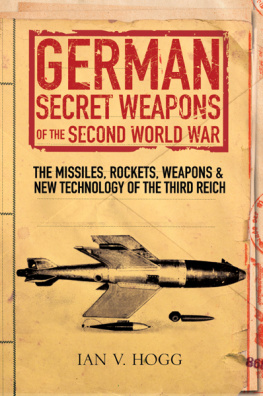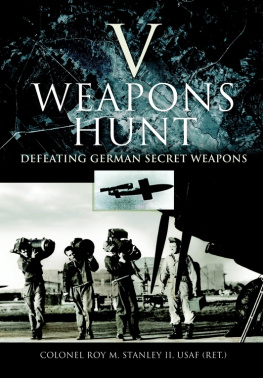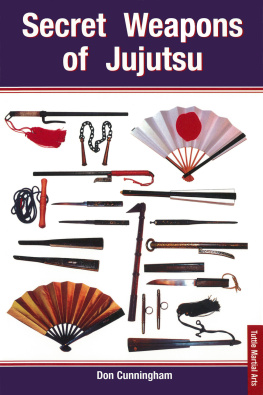Ian V. Hogg - German Secret Weapons of the Second World War
Here you can read online Ian V. Hogg - German Secret Weapons of the Second World War full text of the book (entire story) in english for free. Download pdf and epub, get meaning, cover and reviews about this ebook. year: 2015, publisher: Pen & Sword Books, genre: Religion. Description of the work, (preface) as well as reviews are available. Best literature library LitArk.com created for fans of good reading and offers a wide selection of genres:
Romance novel
Science fiction
Adventure
Detective
Science
History
Home and family
Prose
Art
Politics
Computer
Non-fiction
Religion
Business
Children
Humor
Choose a favorite category and find really read worthwhile books. Enjoy immersion in the world of imagination, feel the emotions of the characters or learn something new for yourself, make an fascinating discovery.
- Book:German Secret Weapons of the Second World War
- Author:
- Publisher:Pen & Sword Books
- Genre:
- Year:2015
- Rating:3 / 5
- Favourites:Add to favourites
- Your mark:
- 60
- 1
- 2
- 3
- 4
- 5
German Secret Weapons of the Second World War: summary, description and annotation
We offer to read an annotation, description, summary or preface (depends on what the author of the book "German Secret Weapons of the Second World War" wrote himself). If you haven't found the necessary information about the book — write in the comments, we will try to find it.
Ian V. Hogg: author's other books
Who wrote German Secret Weapons of the Second World War? Find out the surname, the name of the author of the book and a list of all author's works by series.
German Secret Weapons of the Second World War — read online for free the complete book (whole text) full work
Below is the text of the book, divided by pages. System saving the place of the last page read, allows you to conveniently read the book "German Secret Weapons of the Second World War" online for free, without having to search again every time where you left off. Put a bookmark, and you can go to the page where you finished reading at any time.
Font size:
Interval:
Bookmark:
German Secret Weapons of the Second World War

A Greenhill Book
First published in 1999 by Greenhill Books, Lionel Leventhal Limited
www.greenhillbooks.com
This paperback edition published in 2015 by

Frontline Books
an imprint of Pen & Sword Bookws Ltd,
47 Church Street, Barnsley, S. Yorkshire, S70 2AS
For more information on our books, please visit
or write to us at the above address.
Copyright Ian Hogg, 1999
The right of Ian Hogg to be identified as the author of this work has been asserted by him in accordance with the Copyright, Designs and Patents Act 1988.
ISBN: 978-1-84832-781-8
PDF ISBN: 978-1-47387-768-9
EPUB ISBN: 978-1-47387-767-2
PRC ISBN: 978-1-47387-766-5
All rights reserved. No part of this publication may be reproduced, stored in or introduced into a retrieval system, or transmitted, in any form, or by any means (electronic, mechanical, photocopying, recording or otherwise) without the prior written permission of the publisher. Any person who does any unauthorized act in relation to this publication may be liable to criminal prosecution and civil claims for damages.
CIP data records for this title are available from the British Library
Edited and designed by Donald Sommerville
Printed and bound by CPI Group (UK) Ltd, Croydon, CR0 4YY
Contents
Photographs
Line drawings
Introduction
On 19 September 1939 Adolf Hitler visited Danzig, lately a free city, now incorporated into the German Reich as a result of the Polish campaign. In a speech to a rally of Nazi party members he said,
Es knnte sehr schnell der Augenblick kommen, da wir eine Waffe zur Anwendung bringen in der wir nicht angegriffen werden knnen.
Like so many of Hitlers utterances this can be interpreted in various ways; strictly, the literal translation runs,
The moment might very quickly come for us to use a weapon with which we could not be attacked.
Because of mis-hearing or mis-reporting this was widely quoted in the British press as a reference to some unknown, un-named, secret weapon about which Hitler was hinting in order to terrify his opponents. But no such weapon appeared, and within a year or so Hitlers Secret Weapon became the subject of music-hall jokes. To the man in the street, or the soldier on the conscript recruits basic training course, the term came to be applied to any military device of dubious worth or any soldier of more-than-average clumsiness; anything, in other words, which tended to hinder the smooth progress of the Allies and thus give aid and solace to the enemy.
Since the war Hitlers phrase has been mulled over and, in retrospect, applied to just about everything from the Panzer division to the nuclear bomb, and sometimes on the flimsiest of assumptions, liberally laced with perhaps, possibly and it may be assumed. What many of these interpretations overlook is that Adolf Hitler was addressing a Nazi Party rally; and in those circumstances he might be expected to draw the long bow, hint at greater things to come, and generally assume the air of omnipotence which political leaders of all shades tend to assume on the platform. And the faithful were expected to take the whole thing with a pinch of salt. After all, when Churchill said to Roosevelt, Give us the tools and we will finish the job, he did not literally mean that if America sent Britain a shipload of rifles the British would immediately dash off and defeat the entire German Army, and nor did anyone believe he meant that for a minute. It was stimulating rhetoric, no more and no less, and Hitlers speech deserves to be classed in the same category.
Nevertheless, even stimulating rhetoric needs some basis upon which to be built, and by September 1939 Hitler knew very well that his scientists and engineers were busy developing new weapons. He may not have known very much about their details, but he knew of their general intent and possibilities, and he doubtless felt that to suggest that, one day, the German nation might use weapons which the other side did not have was a fairly sound prophecy which was unlikely to rebound on him. But I think it unrealistic to assume, as has been done, that in this relatively throw-away line, Hitler was specifically referring to nuclear bombs, nerve gas, biological warfare or any other of the more exotic devices favoured by conspiracy theorists. He was much more likely to have been thinking about the 80cm Gustav railway gun, jet-propelled aircraft, various rocket projects and recoilless guns, all of which were then well advanced in their development, all of which were well within Hitlers technical comprehension, and none of which, to Germanys knowledge, were under development or suspected by the British or French.
Allied responses
However, on the British side of the North Sea there were, behind the scenes, people who listened to Hitlers words and, whilst still eyeing the salt-cellar, knew enough to realise that there might, just, be something behind them worth investigating. They, too, believed that such a statement implied that there was a foundation which, though possibly not earth-shaking, was at least worth closer study. In the course of the war they gradually accumulated knowledge of weapon projects within Germany which were obviously a serious threat to the Allies, and in many cases they were able to instigate action to counter these weapons. As they uncovered this information, piece by piece, it suggested a depth of scientific and engineering research which held promise of even more discoveries, and as the war began to draw to its close, both the British and American authorities made plans for a thorough investigation of every German research station, test ground, firing range, munitions factory and laboratory, so that all these potential secrets might be uncovered and investigated, possibly to the Allies advantage in the continuation of the war against Japan, possibly for their commercial advantage in the post-war world.
As a result, there came into being a number of agencies charged with this investigation: the British Intelligence Objectives Sub-Committee (BIOS), which gradually became subsumed into the Combined Intelligence Objectives Sub-Committee (CIOS) and which were both prepared to investigate anything they came across; the Alsos Mission, specifically directed to investigate German nuclear research; Operation Paperclip, an American investigation of the German missile industry, primarily aimed at gathering up everything involved, from notebooks to research scientists, and shipping them back to the USA for interrogation and employment, before the British or French or Russians could do the same; and several other bodies of more-or-less official standing. As the Allied armies advanced in 1944 and 1945 so these various parties, frequently more concerned with keeping their activities secret from competing agencies than of uncovering German secrets, advanced close behind them.
What they uncovered proved to be startling in its breadth of subjects and depth of endeavour, since there were scores of weapon projects afoot in Germany of which the Allies had known nothing. The CIOS alone, for example, produced over 13,000 reports on its investigations; some were the results of careful analysis by Allied scientists and engineers, others were voluminous narratives of wartime research produced by simply taking the German most closely concerned with the project, sitting him down with a pencil and paper, and telling him Write down all you know about Project X and then you can go home.
Some of what was uncovered forms the subject of the following pages; some of it is fairly well known, much of it less well-known. But perhaps the most important thing which the Allies discovered was that luck had been on their side; the potential for dangerous German weapons was enormous, but the practical effect was diminished by the chaotic administration and organisation which should have been directing it.
Next pageFont size:
Interval:
Bookmark:
Similar books «German Secret Weapons of the Second World War»
Look at similar books to German Secret Weapons of the Second World War. We have selected literature similar in name and meaning in the hope of providing readers with more options to find new, interesting, not yet read works.
Discussion, reviews of the book German Secret Weapons of the Second World War and just readers' own opinions. Leave your comments, write what you think about the work, its meaning or the main characters. Specify what exactly you liked and what you didn't like, and why you think so.












